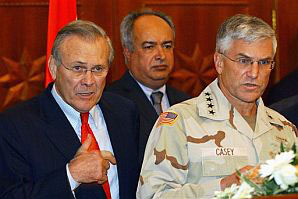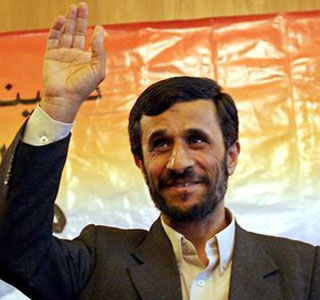
Secretary Rumsfeld with General Casey in Iraq
A 2006
U.S. plan to attack Iran detailed
by Aljazeera.com
on 31
Devcember 2005
At the early
stages of Bush's second term, Vice President Dick Cheney dropped
a bombshell, hinting that Iran was "right at the top of the
list" of the rogue enemies of the United States, and that Israel
would, so to speak, "be doing the bombing for us", without
U.S. military having to ask them "to do it".
"One of the concerns people have is that Israel might do it
without being asked... Given the fact that Iran has a stated policy
that their objective is the destruction of Israel, the Israelis
might well decide to act first, and let the rest of the world worry
about cleaning up the diplomatic mess afterwards," (quoted
from an MSNBC Interview Jan 2005)
Amid numerous media reports’ predictions that the United States,
backed by Israel, will launch a military strike, targeting Iran’s
nuclear sites in 2006, Germany's Der Spiegel suggests that speculation
about a U.S. attack against the Islamic republic is particularly
rife in NATO-member Turkey.
Der Spiegel stated that Washington has been holding talks with allies
in preparation of an air assault on Iran, the Deutsche Depeschendienst,
Germany's second leading news agency, reported after DPA put out
an article by Udo Ulfkotte, a former editor for one of Germany's
main dailies Frankfurter Allgemeine Zeitung (FAZ) and an intelligence
service, warning of such attack.
Ulfkotte, who named his sources as "Western security circles,"
without elaborating, says that during a visit to Istanbul, U.S.’s
Central Intelligence Agency Director Porter Goss asked Turkish Prime
Minister Tayyip Erdogan to support the air strikes against Iranian
nuclear facilities in 2006 and that by stepping up the exchange
of intelligence.
Over the past few weeks, DDP says, Washington contacted the governments
of Saudi Arabia, Jordan, Oman and Pakistan seeking the same kind
of cooperation.
During his Istanbul visit, Goss gave Turkish security services three
dossiers alleging a link between Iran and Al Qaeda network. A fourth
dossier focuses on the Iran's nuclear program, which Washington
and Israel claim is being used as a guise to hide Iran’s attempts
and efforts to develop nuclear bomb.
German intelligence sources revealed that the CIA director affirmed
that he would inform the Turkish government several hours ahead
of any attack. He also, according to the sources, sort of green-lighted
almost simultaneous Turkish attacks on camps in Iran run by the
PKK, the Kurdish separatist organization, which is weird because
the PKK runs its camps out of northern Iraq and has no such installations
in Iran.
On the other hand, a German military officer who demanded anonymity
stated that "It would surprise me enormously if the Americans
did not use this pretext supplied by Teheran. The Americans must
attack Iran before it develops nuclear weapons. Afterwards, it would
be too late."
Earlier this year, Seymour Hersh of the New Yorker wrote that American
commandos were on reconnaissance missions inside Iran, selecting
military targets.
At the time, specifically in January 2005, the U.S. Department of
Defense downplayed Hersh's story, claiming that the article was
riddled with "errors of fundamental fact," although the
U.S. President Bush himself refused to rule out the use of force
against Iran to prevent it from carrying on with its nuclear plans.
But predictions of an imminent military strike by the U.S. against
Iran centers more on developments in Turkey, the article says- and
that due to the repetitive visits of high Bush’s administration’s
officials and NATO officials to the Turkish capital.
Just few days ago, the FBI Director Robert Mueller, Director Goss
and then NATO Secretary General Jaap de Hoop Scheffer visited Turkey.
Also the Secretary of State CondoLeezza Rice dropped in on Turkey
after her visit to Berlin.
Moreover, numerous reports on Turkish newspapers have been speculating
about preparations for an attack on Iran, however all of them aren’t
based on any hard facts.
Recently, Cumhuriyet, a leftist nationalist paper ran a front page
story with this headline: "Now it’s Iran's Turn,"
commenting on a meeting between Prime Minister Erdogan and Director
Goss, who also met with Turkish Intelligence Services (MIT).
Also earlier this month, Yasar Buyukanit, the head of the Turkish
Army and likely future military Chief of Staff, paid a visit to
Washington, after which he declared that relations between the Turkish
and U.S. Armies are once again excellent, after being in deep freeze
for some time.
But many diplomats suggest that Erdogan and the Turkish military
are worried about the situation in the entire region should the
U.S. or Israel strike Iran.
And some experts have warned that any strike against Iran's nuclear
facilities would be very unsuccessful.
Adding a new twist to the international tension over Iran's nuclear
programme, BUSH made it clear few days ago that in case Israel decides
to attack Iran, it will have the U.S. full support to destroy the
Islamic regime's “capacity to make an atomic bomb”.
Asked whether he would back Israel if it attacked Iran's nuclear
facilities, President Bush first expressed cautious solidarity with
European efforts, led by the EU big states; Britain, France and
Germany, to negotiate with Iran.
But later, he said that all nations should be concerned about whether
Iran could produce nuclear arms.
"Clearly, if I was the leader of Israel and I'd listened to
some of the statements by the Iranian ayatollahs that regarded the
security of my country, I'd be concerned about Iran having a nuclear
weapon as well. And in that Israel is our ally, and in that we've
made a very strong commitment to support Israel, we will support
Israel if her security is threatened."
|


